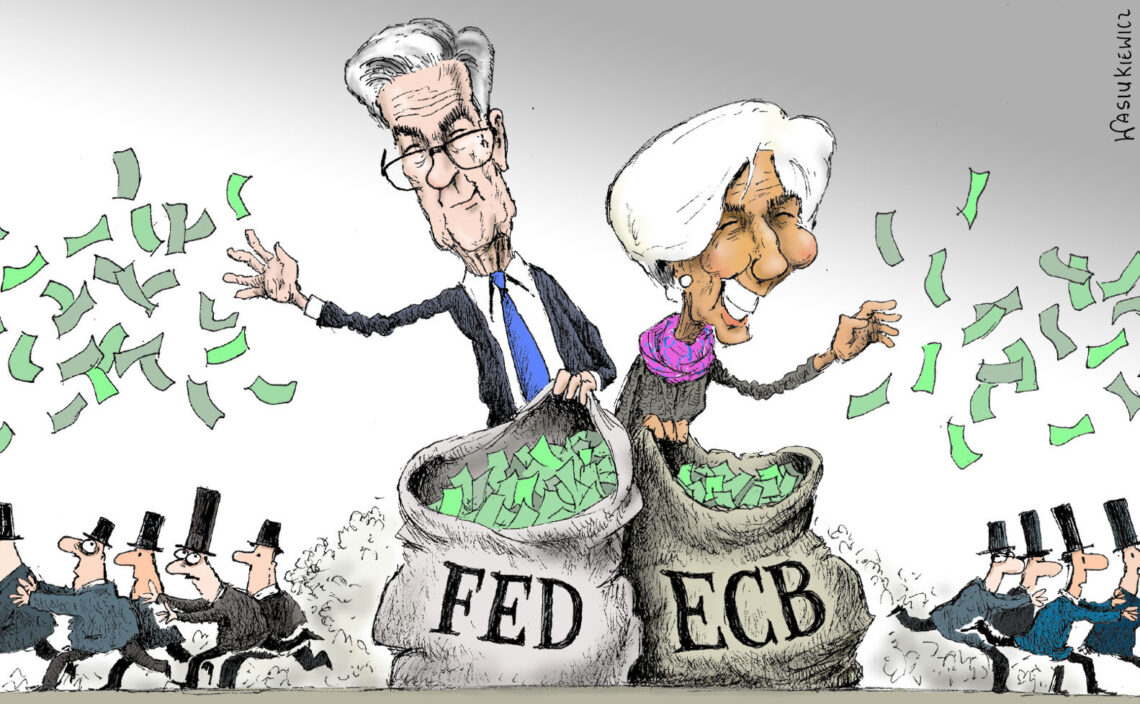Europe after the crisis
The Covid-19 pandemic is dealing body blows to the world economy, but it is not the root cause of concerns about Europe’s future. Brussels’ and Frankfurt’s stock responses to the impending crisis only bring Europe closer to socialist-style centralization.

Since people started panicking about the virus, most seem to have neglected that COVID-19 is not only a threat to our health and economic tranquility, but also becoming a major political issue, especially in Europe, where more economic tensions are to come.
The European Union’s response to the developing, pandemic-triggered crisis tends to replicate its reaction to the 2008 emergency: money printing, easy credit and massive public expenditure. What is different this time is that we may be also heading toward a remarkable increase in centralization: the Chinese system has suddenly found admirers in many quarters.
The ECB’s role
Those who doubt the need to centralize and hand out banknotes have been the target of all sorts of nastiness. The furious reaction to European Central Bank President Cristine Lagarde’s statements during a March 12 press conference has been the most striking example, but the incident was not isolated. Europe’s politicians are warming up for an approaching confrontation. Its outcome will have repercussions for years to come.
Technically, Ms. Lagarde was correct. The ECB is not in the business of bailing out banks and it should not finance budget deficits or bad debtors. She deserves credit for having said it so clearly. Money printing and public expenditure do not spawn wealth. Instead, they redistribute wealth. Regardless of what one thinks of redistribution, this is the politicians’ game; central bankers should stay out of it.
This point was the core of the ECB president’s message. However, Ms. Lagarde made two mistakes. First, she forgot that she was not appointed to lead the ECB because of her outstanding economics knowledge nor for her previously espoused views on the role of monetary policy. She has landed the job in Frankfurt because she was perceived as someone who knows how to move in the world of politics. Yet she failed to agree on a common strategy with political leaders and ignored what the public’s reaction to her statement could be.
If this deal no longer holds, the euro is going to become meaningless and national populisms will break lose.
Moreover, Ms. Lagarde lacked in statesmanship by failing to lead the way and make Brussels acknowledge that the euro has now developed into a political issue. During the past decade, Europe’s currency has, in effect, been turned into an instrument for shielding the indebted eurozone countries from market pressure – thanks to an implicit EU guarantee. In exchange, the financially stronger members received a free hand in dictating the agendas on a variety of critical matters, including foreign trade and regulation. That was the deal. If this deal no longer holds, the euro is going to become meaningless and national populism will break loose.
Brussels must choose. It can force the ECB to monetize further indebtedness of the national governments and ensure that future inflation makes these debts sustainable. Or the central bank could finance local expenditure and then stop the printing presses after inflation awakens. Or, the EU leaders can stay put, take on the chin the consequences of irresponsible populism and do what it takes to minimize the cost of moving toward a Union radically different from what we have today.
If the last option is chosen, the EU should, of course, brace for a dramatic cure and go back to its roots: forget about the rhetoric of harmonization, give up all projects designed to shape a European ideal of technocratic socialism, and content itself with enforcing the four freedoms advocated by its founding fathers.
All the above, of course, is not new. However, COVID-19 could quickly deliver a final blow to the shaky construct. If today’s popular policy recipes prevail, public expenditure and paper money might help people feel better for a while longer. These solutions do not create wealth, in any case. In fact, they are a kiss of death for business and entrepreneurship across the continent, and the harbinger of tensions on a much broader scale, well beyond Europe.







